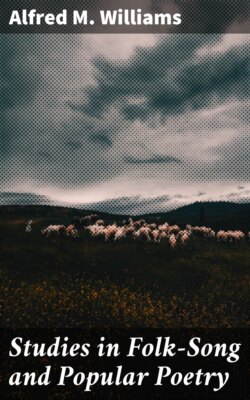Читать книгу Studies in Folk-Song and Popular Poetry - Alfred M. Williams - Страница 11
На сайте Литреса книга снята с продажи.
FREEDOM'S GUIDE.
ОглавлениеTable of Contents
Our country now is great and free,
And this forever it shall be.
We know the way—we know the way.
Though Southern foes may gather here,
We will protect what we hold dear.
We know the way.
Chorus. We know the way—we know the way.
Through Baltimore, hooray.
For our guide is Freedom's banner.
Hooray, hooray.
The way is through Baltimore.
The South shall see that we are true,
And that we know a thing or two.
We know the way—we know the way.
As Yankee boys we are at hand,
Our countless throngs shall fill the land.
We know the way.
From east to west, from south to north,
We 'll send our mighty legions forth.
We know the way—we know the way.
The freedom that our fathers won
Shall be defended by each son.
We know the way.
Then shout, then shout o'er hill and plain,
We will our country's rights maintain.
We know the way—we know the way.
We will always guard it with our might,
And keep steadfast in the right.
We know the way.
Old Jeff has now begun to lag,
He knows that we 'll stand by the flag.
We know the way—we know the way.
With Scott to guide us in the right,
We 'll show them how the Sixty-Ninth can fight.
We know the way.
An organization almost equally popular with the New York ballad singers, in the early days of the war, was the "Fire Zouaves," recruited among the firemen of the metropolis, and which was expected to perform wonderful feats of daring and energy, from the character of its material. Its leader, Colonel Elmer E. Ellsworth, was killed by the landlord of a hotel in Alexandria, Va., while hauling down the rebel flag from the roof, and his death created a deep sensation from its dramatic character, and from the fact that it was among the earliest in the war. The elegies upon his death were numerous, as well as those in praise of the regiment itself. One of the latter, by Archibald Scott, whose name, contrary to the usual custom, was prefixed to the ballad, had a good deal of rude vigor, of which the following is a specimen:—
Shall ugly plugs of Baltimore,
Who come out with stones and staves,
Get leave our patriots' blood to pour,
And drive our soldiers from their shore?
No, no! by Hell, in flames shall roar
Their city first by York Zouaves!
Another phase of life in the cities, from that of the enthusiasm of the young men in marching to the war and the fervent appeals for enlistment, was that of the feelings of the women whose sons and husbands left their workshops to join the army. The grief was as bitter and the patriotism as sincere among the inmates of the crowded tenement houses and the narrow and barren homes of the families of the workingmen of New York as among their sisters in the farmhouses in the country, whose surroundings better lent themselves to the illumination of poetry, and it cost as much to put down the tin pail of the city laborer as for the farmer to
Lay down the axe, fling by the spade,
and even more in pinching poverty and lack of resource. But the griefs and sacrifices of these women of the city tenement and noisome alley have found no place in the genteel poetry of the war, and have only been expressed in the rude verse of the street ballad. Says one of them:—
It was in the month of April,
As I walked out one day,
I met a woman weeping
As I walked down Broadway.
She was weeping for her Johnny,
Her dear and only son,
Who joined the Northern army
To fight in Washington.
O Johnny! I gave you a schoolin',
I gave you a trade likewise,
And when you joined the Volunteers,
You know't was my advice."
The New York ballad writers were not entirely confined to the English language, the large foreign population furnishing recruits of all nations. There is not, so far as I have seen, any original German song devoted to the Union cause, but The Red, White, and Blue, and other patriotic songs, were published in German text; and of Germanized English songs, most if not all the product of variety theatre performers, there were a great many, including the extremely popular I'm going to fight mit Siegel.
Ven I comes from de Deutsche Countree,
I vorks somedimes at baking.
Den I keeps a lager bier saloon,
And den I goes shoemaking.
But now I vas a sojer man
To save the Yankee eagle,
To Schlauch dem dam Southern folks,
I'm going to fight mit Siegel.
But this was no more representative of German sentiments than the "Whack-row-de-dow" Pats of the stage were of the Irish; and the German soldiers, when they sang in the vernacular, enlivened their foreign patriotism with the songs of the Fatherland. There was at least one French poet who appealed to his countrymen in their own language to rally to the cause of the Union. His production was as follows:—
